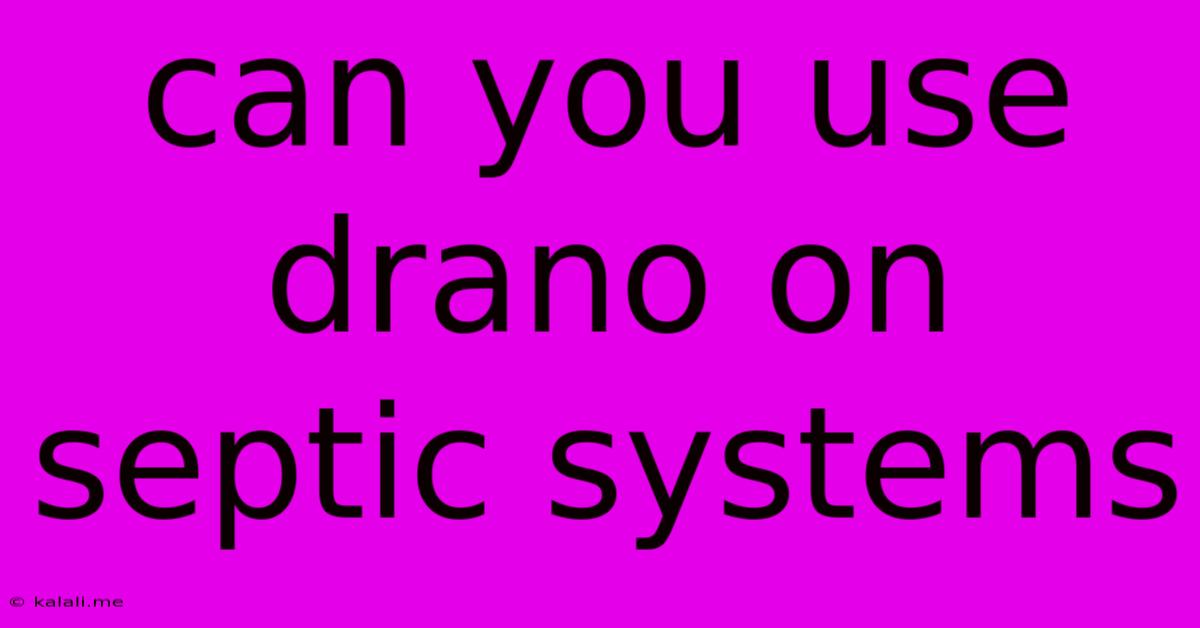Can You Use Drano On Septic Systems
Kalali
Jun 09, 2025 · 3 min read

Table of Contents
Can You Use Drano on Septic Systems? A Comprehensive Guide
Meta Description: Wondering if you can use Drano in your septic system? This guide explores the risks and consequences of pouring chemical drain cleaners like Drano into your septic tank, offering safer alternatives for unclogging drains. Learn how to maintain a healthy septic system and avoid costly repairs.
Using chemical drain cleaners like Drano in your septic system is a risky gamble that can lead to serious and costly problems. While it might seem like a quick fix for a slow drain, the harsh chemicals can wreak havoc on the delicate balance of your septic system's bacterial ecosystem, ultimately leading to system failure. This article will explore why using Drano on a septic system is strongly discouraged and offer safer, more effective alternatives.
The Dangers of Drano and Other Chemical Drain Cleaners
Drano and similar products contain highly corrosive chemicals designed to dissolve clogs. These chemicals are effective at breaking down organic materials that cause blockages in your plumbing, but they also attack the beneficial bacteria crucial for the proper functioning of your septic tank. These bacteria break down waste into liquid and solids, a process vital for preventing backups and sewage overflows. Damaging this bacterial colony can lead to:
- System Failure: The inability of the bacteria to process waste results in a buildup of solids, leading to clogs and ultimately septic tank failure. This necessitates expensive pumping and potentially even complete system replacement.
- Environmental Damage: The corrosive chemicals can leach into the soil surrounding the septic tank, contaminating groundwater and harming the environment.
- Voiding Warranties: Many septic system warranties explicitly state that using chemical drain cleaners will void the coverage, leaving you responsible for all repair costs.
- Health Hazards: The fumes from these chemicals can be harmful to your health, causing respiratory irritation and other problems.
Safer Alternatives for Clogged Drains
Instead of resorting to harsh chemicals, consider these safer and more environmentally friendly alternatives for dealing with clogged drains:
- Boiling Water: Pouring a pot of boiling water down the drain can often melt away grease and soap buildup, clearing minor clogs.
- Baking Soda and Vinegar: This classic combination creates a fizzing reaction that effectively breaks down organic clogs. Pour baking soda down the drain, followed by vinegar, and let it sit for 30 minutes before flushing with hot water.
- Plunger: A good old-fashioned plunger is surprisingly effective at dislodging many clogs. Make sure to create a tight seal around the drain opening for optimal results.
- Plumbing Snake (Auger): For more stubborn clogs, a plumbing snake can reach further down the drain to break up or remove the obstruction. This is a good option for clogs further down the line than what a plunger can reach.
- Professional Plumber: If none of the above methods work, it's best to call a professional plumber. They have specialized tools and expertise to handle complex drain problems without harming your septic system.
Maintaining a Healthy Septic System
Regular maintenance is key to preventing clogs and ensuring the longevity of your septic system. This includes:
- Regular Pumping: Schedule regular septic tank pumping, typically every 3-5 years, depending on household size and usage.
- Avoid Flushing Improper Items: Never flush anything other than toilet paper and human waste down the toilet. Avoid putting grease, oils, and other harmful substances down your drains.
- Water Conservation: Reducing water usage can lessen the strain on your septic system.
- Regular Inspections: Periodic inspections by a professional can help identify potential issues early on.
In conclusion, using Drano or any chemical drain cleaner on a septic system is strongly discouraged. The risks far outweigh the perceived benefits. By employing safer alternatives and practicing good septic system maintenance, you can avoid costly repairs and environmental damage, keeping your system functioning smoothly for years to come.
Latest Posts
Latest Posts
-
Small Round Black Bugs In House
Jun 09, 2025
-
How To Wire A 3 Way Switch With 3 Switches
Jun 09, 2025
-
The First Ever Sequl To A Book
Jun 09, 2025
-
Where Do You Put Laundry Detergent
Jun 09, 2025
-
How To Rotate The Text In Photoshop
Jun 09, 2025
Related Post
Thank you for visiting our website which covers about Can You Use Drano On Septic Systems . We hope the information provided has been useful to you. Feel free to contact us if you have any questions or need further assistance. See you next time and don't miss to bookmark.